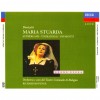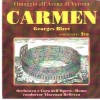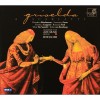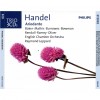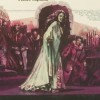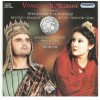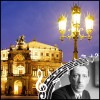歌剧剧本
Das Rheingold ("The Rhine Gold") is the first of the four operas that comprise Der Ring des Nibelungen (The Ring of the Nibelung), by Richard Wagner. Das Rheingold was originally written as an introduction to the tripartite Ring; however, the cycle is generally regarded as composed of four individual operas.
It received its premiere at the National Theatre in Munich on 22 September 1869, with August Kindermann in the role of Wotan, Heinrich Vogl as Loge, and Wilhelm Fischer as Alberich, much to Wagner's disgust, since he wanted this opera to be premiered as part of the entire cycle, however he was forced to allow the performance at the insistence of his patron King Ludwig II of Bavaria. The opera received its premiere as part of the complete cycle on 13 August 1876, in the Bayreuther Festspielhaus.
History
History provides few examples of artistic purpose so consistently followed as that which produced Wagner's tetralogy Der Ring des Nibelungen (The Nibelung's Ring). As early as the 1840s Wagner began to search Teutonic and Norse mythology for material for his epic, and it was not until the end of 1874 that the last bar of Götterdämmerung (“The Twilight of the Gods”) was scored. Wagner's first plan was to compose one opera only, to be called “Siegfried's Death”, and for this he wrote the poem, which follows roughly the same course as that of the present Götterdämmerung, in 1848. It soon became obvious, however, that so much preliminary explanation would be necessary if the events of “Siegfried's Death” were to be clear to the spectator that some kind of introductory drama was desirable. Thus Wagner planned a second work, to precede “Siegfried's Death″ and to be called “Young Siegfried”, and then he added two others, so that the project eventually embraced the whole gigantic tetralogy of the Ring.
Wagner did not, of course, work exclusively on the Ring during the thirty-odd years between its original conception and its completion. The poems of the four operas were written in the late 1840s and early 1850s; the music for Das Rheingold was composed in 1853-4, that for Die Walküre in 1854-6; and in 1856-7 Wagner composed, though he did not score, the first two acts of Siegfried; but at this point he laid down his pen, as far as the Ring was concerned, for twelve years, producing in the meantime Tristan und Isolde and Die Meistersinger von Nürnberg. In 1869, however, he took up work on the Ring again, his enthusiasm and inspiration unimpaired, and in the years 1869-74 completed Siegfried and created the mighty finale to the tetralogy, Götterdämmerung.
Das Rheingold was first performed at Munich on September 22th 1869. Its first performance as part of the complete Ring cycle took place at Bayreuth on August 13th 1876.
Synopsis
Das Rheingold, then, is the first opera of the Ring tetralogy. It is considerably shorter than its three successors, and consists of four scenes which are performed without a break. But the scale of the work of which it forms a part is at once established in the prelude to the opera which portrays the motions of the river Rhine in an astonishing passage extending over 136 bars consisting simply of figurations of the chord of E flat. The opening stillness gives way to a rippling effect which increases to a music of surging power, until the curtain rises to show the three Rhine maidens, Woglinde, Wellgunde and Flosshilde swimming in the depths of the river. The key shifts to A flat, as Woglinde begins an innocent song whose melody is frequently used to characterise the Rhine maidens later in the cycle.
Scene 1
Das Rheingold begins with a 136-bar unmodulating prelude outlining an E flat major chord, which is meant to represent the eternal unchanging motions of the River Rhine. It is considered the best known drone piece in the concert repertory, lasting approximately four minutes.[1] It was claimed by Wagner in his autobiography Mein Leben[2] that the musical idea came to him while he was half asleep in a hotel in La Spezia in Italy, but this has been disputed by Deathridge and others.[3] The music grows in power, and the curtain rises. At the bottom of the River Rhine, the three Rhinemaidens (Woglinde, Wellgunde, and Flosshilde) are playing together near the Rheingold. Alberich, a Nibelung dwarf, appears from a deep chasm and tries to woo them. Struck by Alberich's ugliness, the Rhinemaidens mock his advances and he grows angry. As the sun begins to rise, maidens praise the golden glow atop a nearby rock; Alberich asks what it is. The Rhinemaidens tell him about the Rhinegold, which their father has ordered them to guard: it can be made into a magic Ring which will let its bearer rule the world, but only by someone who first renounces love. They think they have nothing to fear from the lustful dwarf, but Alberich, embittered by their mockery, curses love, seizes the gold and returns to the depths, as the Rhinemaidens flee in despair.
Scene 2
Wotan, ruler of the Gods, is asleep on a mountaintop with Fricka, his wife. Fricka awakes and sees a magnificent castle behind them. She wakes Wotan and points out that their new home has been completed. The giants Fasolt and Fafner built the castle; in exchange Wotan has offered them Fricka's sister Freia, the goddess of youth and beauty and feminine love. Fricka is worried for her sister, but Wotan is confident that they will not have to give Freia away, because he has dispatched his servant Loge to search the world for something else to give the giants instead.
Freia enters, screaming in fear, followed by Fasolt and Fafner. Fasolt demands payment for their finished work. He points out that Wotan's rule is sustained by the treaties carved into his spear, including his contract with the giants, which Wotan therefore cannot violate. Donner (god of thunder) and Froh (god of spring) arrive to defend their sister Freia, but Wotan stops them; he cannot stop the giants by force and renege on their agreement. Hoping Loge will arrive with the alternative payment he promised, Wotan tries to stall.
When Loge finally shows up, his report is discouraging: there is nothing that men will accept in exchange for feminine love (and by extension, nothing the giants would accept in exchange for Freia). Loge tells them that he was able to find only one instance where someone willingly gave up love for something else. Alberich the dwarf has renounced love, stolen the Rheingold and made a powerful magic ring out of it. A general discussion of the ring ensues and everyone finds good reasons for wanting it. Fafner makes a counteroffer: the giants will accept the Rheingold in payment, instead of Freia. When Wotan tries to haggle, the giants depart, taking Freia with them as hostage.
Freia's golden apples had kept the Gods eternally young; with her absence, they begin to age and weaken. In order to win Freia back, Wotan resolves to follow Loge down into the earth, in pursuit of the ring.
An orchestral interlude follows that "paints" the descent of Loge and Wotan into Nibelheim. As the orchestra fades, it gives way to a choir of 18 tuned anvils (indicated in the score with specific size, quantity and pitch) beating out the dotted rhythm of the Nibelung theme to give a stark depiction of the toiling of the enslaved dwarves.
Scene 3
In Nibelheim, Alberich has enslaved the rest of the Nibelung dwarves. He has forced his brother Mime, the most skillful smith, to create a magic helmet, the Tarnhelm. Alberich demonstrates the Tarnhelm's power by making himself invisible, the better to torment his subjects. (The Tarnhelm can also change the wearer's shape, and teleport him long distances.)
Wotan and Loge arrive and happen upon Mime, who tells them about Alberich's forging of the ring and the misery of the Nibelungs under his rule. Alberich returns, driving his slaves to pile up a huge mound of gold. When they have finished, he dismisses them and turns his attention to the two visitors. He boasts to them about his plans to conquer the world. Loge tricks him into demonstrating the magic of the Tarnhelm by having him transform into a giant snake (or dragon - the German word Wurm can mean either). Loge suggests that it might be better to transform into a small creature in order to escape danger more easily, so Alberich turns into a toad. While he is a toad, the two gods quickly seize him, tie him up, and drag him up to the surface.
Scene 4
On the mountaintop, Wotan and Loge force Alberich to exchange his wealth for his freedom. They untie his right hand, and he uses the ring to summon his Nibelung slaves, who bring the hoard of gold. After the gold has been delivered, he asks for the return of the Tarnhelm, but Loge says that it is part of his ransom. Finally, Wotan demands the ring. Alberich refuses, but Wotan seizes it from his finger and puts it on his own. Alberich is crushed by his loss, and before he leaves he lays a curse on the ring: until it returns to him, whoever does not possess it will desire it, and whoever possesses it will live in anxiety and will eventually be killed and robbed of it by its next owner. Alberich's discordant "Death-Curse" leitmotif is one of the few leitmotifs which occur regularly and unchanged in all four parts of the Ring Cycle.
The gods reconvene. Fasolt and Fafner return, carrying Freia. Reluctant to release Freia, Fasolt insists that the gold be heaped high enough to hide her from view. They pile up the gold, and Wotan is forced to relinquish the Tarnhelm to help cover Freia completely. However, Fasolt spots a final crack in the gold, and demands that Wotan also yield the ring. Loge reminds all present that the ring is rightly property of the Rhinemaidens. Wotan angrily and defensively declares that he will keep it for his own, and the giants seize Freia and start to leave, this time forever.
Suddenly, Erda the earth goddess, a primeval goddess older than Wotan, appears out of the ground. She warns Wotan of impending doom and urges him to give up the cursed ring. Troubled, Wotan surrenders the ring. The giants release Freia and begin dividing the treasure, but they quarrel over the ring itself. Fafner clubs Fasolt to death (the orchestra repeats the "Death-Curse" leitmotif). Wotan, horrified, realizes that Alberich's curse has terrible power. Loge remarks that Wotan is indeed a lucky fellow; his enemies are killing each other for the gold he gave up.
At last, the gods prepare to enter their new home. Donner summons a thunderstorm to clear the air. After the storm has ended, Froh creates a rainbow bridge that stretches to the gate of the castle. Wotan leads them across the bridge to the castle, which he names Valhalla. Fricka asks him about the name, and he replies that its meaning will be revealed if all goes well (it doesn't, as it turns out).
Loge, who knows that the end of the gods is coming, does not follow the others into Valhalla; he admits he is tempted to destroy them and all they have deceitfully acquired. Far below, the Rhinemaidens mourn the loss of their gold and proclaim that the glory of the gods is only an illusion. The curtain falls.






